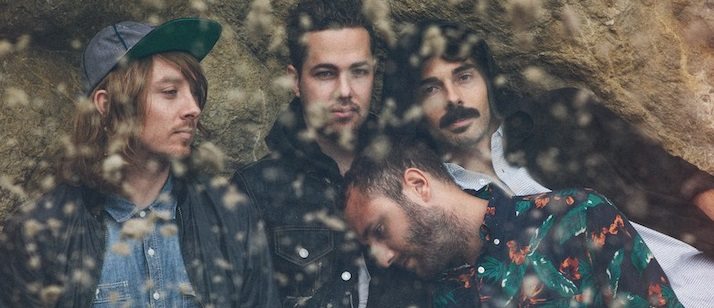Interview: Local Natives
Local Natives are a group which surprise me every time I listen to their music. I have enjoyed both of the band’s critically-acclaimed albums so far (2009’s Gorilla Manor and this year’s Hummingbird) and been blown away – twice – by their sheer force as a live act, thanks to their artful manipulation of album tracks into festival anthems. However, to this day, whenever I scroll to their name on my iPod and select any of the dozen-or-so songs to which – to my unknowing delight – the lyrics seem ingrained in my memory, I feel surprised.
This is a band whose unique sound, songwriting chops and importance in the music scene are perpetually underrated, even by so-called fans such as myself. A few weeks after seeing them perform another storming set at Glastonbury Festival, I had the pleasure of speaking with Taylor Rice, one of the band’s three lead singers. Our discussions ranged from incessant tours, the band’s experimental and personal approaches to recording, and the future for a group now surely deserving of mainstream success.
Boar Music: Hi Taylor, how are you today?
Taylor Rice: I’m good, thank you. Just waking up in Norway.
BM: Of course, you’re deep into festival season at the moment, playing festivals all over Europe. Do you prefer playing at festivals than more conventional venues?
TR: I love the festival season. I think that when you tour all the time, festivals become something to look forward to, if only because it’s a world away from our normal situation. It almost feels like a super-long summer camp! You just roll up, you don’t really sound-check… there’s actually a lot less work! And you get to just hang out and watch bands more.
 BM: You recently played Glastonbury. How did you all find that?
BM: You recently played Glastonbury. How did you all find that?
TR: Glastonbury’s amazing. It’s the most-hyped European festival out there and it always lives up to its title. This was our second time there and it’s a definite favourite for us.
BM: Upon seeing your set at Glastonbury, it struck me how your live shows are incredibly animated and powerful. Is it important to you as a band to work on – and perfect – your live show?
TR: I don’t think it’s necessarily about perfection. The live show is a situation where you can let go, where you’re able to experience playing together while sharing it all with an audience. The record, on the other hand, is something we work on for years and it’s a very thoughtful experience: in certain ways it feels quite careful and analytical. But when you’re playing live, the best shows are always the ones where you let go, stop thinking about perfection, and end up losing yourself in the moment.
BM: A lot of the power in your live performances comes from your unique use of vocal harmonies and multiple percussionists. What influenced this?
TR: As a songwriting team, we’ve been singing and playing music together since we were 13 years old. Back then, we were pretty influenced by ’60s harmonies, so The Beach Boys, Crosby, Stills, Nash & Young and other similar groups were touchstones we all shared. In terms of percussion, listening to early Animal Collective really made us want to experiment with those forms.
BM: So an interesting collision of the classics and the more recent avant-garde. Are there any other acts around today that have influenced your music, or any whom you simply admire?
TR: When we were writing Hummingbird, one record that we got really into was Skying by The Horrors. They just have this awesome, incredibly lush wall of sound thing going on, especially in the way they employ synths. From an aesthetic standpoint, they were a modern band that we talked about a lot. Portishead’s latest record – Third – was also a record that we listened to a lot when we were writing.
BM: Where does the album title Hummingbird come from? What’s the significance behind it?
TR: It comes from a lyric in one of the songs, ‘Columbia’. It’s a symbol for us, and a dedication to Kelsey [Ayer]’s mom, whom the song is about.*
BM: Hummingbird certainly seems heavier and lyrically deeper than Gorilla Manor. How does the lyrical process work within the group?
TR: We went through some really, really incredible things together as a band after Gorilla Manor, but right as we were writing the songs that went on to make up Hummingbird, there were just some intense events which we had to go through. We never explicitly decided to make a record which followed such a direction, but it’s what came out based upon where we were at the time. I think we did make an effort not to shy away from it becoming a personal record: it allowed us to process what was going on, rather than channelling our issues into something else.
We did make an effort not to shy away from Hummingbird becoming a personal record, because it allowed us to process what was going on, rather than channelling our issues into something else.
BM: Has the writing process changed or matured since Gorilla Manor?
TR: In some ways, it’s very much the same. I believe we’re a very democratic and collaborative band, more so than most because we have three songwriters and multiple lead singers. So in that sense, it was quite a similar process, but in other ways, it changed a great deal. Gorilla Manor was very a much a plug-in-and-play effort: we’d just play a song live in a room, record our parts, and then it was pretty much complete.
For Hummingbird, we built our own little studio in Silverlake, Los Angeles, and spent a lot of time experimenting and recording as we went along. I think that has a lot to do with why there seems to be a lot more space on this record. For instance, some songs are built around synthetic drums and drum samples: something you’re not going to deal with unless you’re open to messing around with ideas as you record.
BM: Personally, which album of the two are you most proud of?
TR: I’m more proud of Hummingbird. Our goal as a band has always been to push ourselves as musicians and songwriters. And for me, we achieved that. I’m proud of the fact that the songs feel more direct and personal.
 BM: Both albums have been critically acclaimed. Do you feel any pressure following such praise?
BM: Both albums have been critically acclaimed. Do you feel any pressure following such praise?
TR: Well, writing a debut is very different, because as much as you want to share it with the world, and as much as you’d like an audience which is ready and waiting, those are the only real things you hope for. It’s different for the second album, when there is this real weight of expectation; when its not just in your head. That’s why we wanted to unplug from touring and from being so involved in all that gossip and pressure. It’s such a rare, crazy thing for all of us to get on the same page and be in love with something. That can take a lot of work. As long as we meet that standard then we’re all happy. Once we get into that space it’s easy to let go of that pressure.
BM: You’re known as an incredibly collaborative band; you even insist on doing all your own artwork amongst yourselves. Why is that?
TR: I think it’s important. We just all want to be involved in everything to do with our creative output. It can cause problems: sometimes I think it’d be nice to have an art director, so that when we’re touring we can just focus on the performances. But even then, we’re always working on new designs for t-shirts. It’s just an area which is near and dear to all of us.
BM: You moved from LA to Brooklyn to record the record. Did this have an effect on your sound? Did you want the record to have a different setting?
TR: We still lived in LA and wrote most of the songs there. But we went to Brooklyn to work with Aaron Dessner [guitarist of The National], and we lived there for two months during the recording. We mainly chose Brooklyn because Aaron lives there, but we also liked the idea of being beyond our comfort zone. I think to do so musically, it can be helpful to do it physically.
BM: What was Aaron Dessner’s role in the making of the album?
TR: He came in after we’d been writing for about nine months, and we had most of the songs that we knew we were going to go with. He came in, and sort of became our sixth band member – the ghost member – but also a mentor figure. It’s very easy to connect with him as a producer, because he’s a songwriter who we all respect, and he’s in a band which we’ve toured with. It was a natural progression of a friendship to a working relationship. He’s also incredible in the studio. We learned an immense amount from him about how to make the recording process even more creative. He’s very adept at bringing spontaneity to the studio, and letting the songs open up.
 BM: Would you work with him again?
BM: Would you work with him again?
TR: Yes, I’d definitely consider it. We got on so well, and because we’re all so picky, without a single dictator the process can become quite a horrible case of constantly-clashing egos. He just fit into the dynamic really well. But I also know that we love doing everything for ourselves and being independent. We’ve talked at distance about the next album, and most of us seem to think that we’ve gleaned enough, and that we can do everything ourselves the next time around.
BM: Have you had any thoughts regarding the direction you’d like to take next?
TR: I do have lots of ideas, but when we were writing Hummingbird, all my specific ideas didn’t happen at all. We had a blueprint, but it just got thrown out the window. There’s a spontaneity to it that can’t be entirely thought through. I remember that towards the end of our Gorilla Manor tour, whenever I’d get this question, I’d say “its really gonna be a guitar record!” We ended up writing most of the songs on guitar, then switching them to a big piano or synth pad. So I could tell you a few thoughts, but I’m sure they’d ultimately be wrong.
* Kelsey Ayer, one of the band’s other lead singers and songwriters, lost his mother whilst writing the songs for Hummingbird. His grief becomes one of the albums preeminent themes.
Research compiled by Jacob Steiner. Local Natives’ second album Hummingbird is out now on Infectious and Frenchkiss Records.

Comments